Here's Matthew Eng on where we are in the career of one of the great screen actresses...
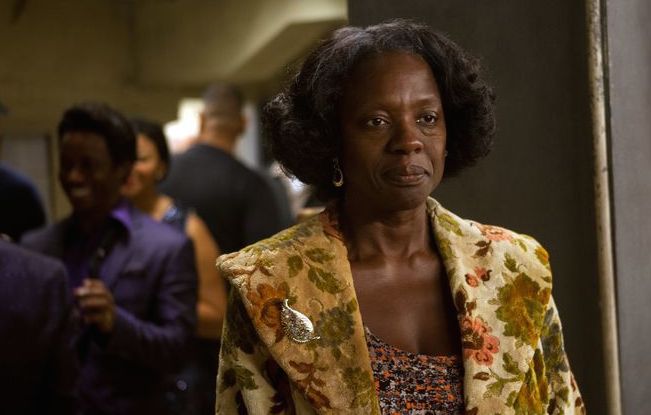
“Holy shit, I love watching this woman act!” is what I immediately thought during Viola Davis’s doozy of a “big scene” in Get on Up, which nearly every review of Tate Taylor’s surprisingly strong James Brown biopic has been well-inclined to praise. As Brown’s aged, long-estranged mama, Davis—with the aid of terrific star Chadwick Boseman and some pretty expert makeup artists whose numbers Clint Eastwood should find immediately—manages to reinvigorate a set-up familiar from any number of tortured artist-biopics (i.e. absentee parent comes groveling years later to abandoned child-turned-superstar at the peak of his fame) with the same smart, electrifying clarity of character and tender yet tough-minded emotionalism that should be long-recognizable by now to anyone who has seen Doubt or Antwone Fisher or Solaris or Won’t Back Down, or else Fences, King Hedley II, or Seven Guitars on Broadway, or, more likely, witnessed Davis’ extraordinary, one-woman rescue job on Taylor’s The Help.
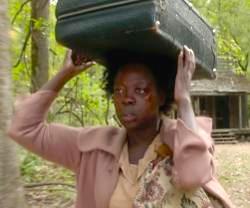 Holy shit, I love watching this woman act. It’s not the first time the thought’s run through my head.
Holy shit, I love watching this woman act. It’s not the first time the thought’s run through my head.
Davis is, as usual, great in Get on Up, a superior musical drama that’s prone at times, like all entries in this genre, to some patchy plotting and tacky set-pieces, but which sports the affecting ensemble, sobering insights, and stellar, sweat-stained concert sequences that Eastwood and his animatronic Jersey Boys could only dream about. Davis’ role is also, as usual, brief but crucial to the movie at-hand. [More...]
in a mere matter of minutes, Davis has to convey the fatigue and frustration of a battered, burnt-out backwoods housewife who’s not a timid victim or a walking corpse but a fiery, quivering, living woman whose love for her son must finally come in second to her own survival. That dressing room reunion with Boseman during Brown’s legendary 1963 show at the Apollo is the emotional clincher of Get on Up in the same way that the Aloysius-Mrs. Miller showdown was the dramatic whopper of Doubt—and with the same trickling snot to boot. Davis has a few short but significant scenes preceding this, but nothing else to rival that final failed moment of fence-mending between mother and son. With just another meaty scene or two, she could’ve potentially found her way onto a number of Oscar ballots.
Then again, Davis is probably going to be a bit busy this Oscar season anyway top-lining her new Shonda Rhimes-ABC drama How to Get Away with Murder, in which she’s plays Annalise Keating, an elite but enigmatic criminal defense professor shepherding a flock of eager young law students, while becoming engrossed in a murder amid all the sleek ivory intrigue and smutty, TV-14 bed-hopping, while seemingly giving Davis the opportunity to play the sort of deeply conflicted, morally muddled antihero that have come to define the latter part of Denzel Washington’s career, although, in this case, on a considerably smaller screen.
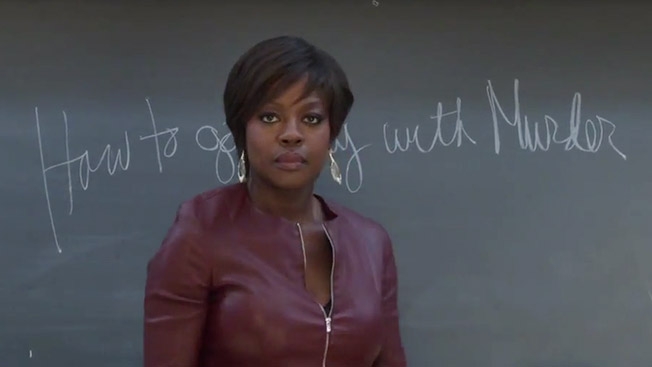
Lots of us, including some of us here at TFE, are a bit too quick to groan when our most gifted film actresses make the full-time leap to series television, even though ABC, A&E, FX, HBO, Netflix, Showtime, TNT, and the whole lot have easily offered the fullest, most front-and-center roles that Kerry Washington, Vera Farmiga, Glenn Close, Laura Dern, Robin Wright, Laura Linney, Toni Collette, and Holly Hunter have gotten to tackle in the past five years. That’s a pretty superb roster of actresses. And now, Viola Davis.
I have bitterly resigned myself to the fact that Hollywood’s complete ineptitude in knowing what to do with actresses of color who aren’t Zoe Saldana or Halle Berry (and, sadly, even those who are Zoe Saldana and Halle Berry) never boded well for Viola Davis’ cinematic future, despite a string of fierce and fruitful supporting work, as well as one peerless lead performance that seemed destined to leap her off the brink and by all rights should’ve copped her an Oscar, the loss of which is perhaps my unhappiest Academy memory, even taking into account the grace and generosity of the victor herself. We all realize eventually that the same industry which dragged its fucking feet in finding a worthwhile vehicle for Lupita Nyong’o to star in in the months following her Oscar win, while conferring part upon part to someone like the otherwise fine Margot Robbie for playing a talking sex doll for Scorsese in the same year, can only carry the Angela Bassets, Kimberly Elises, Alfre Woodards, Loretta Devines, Mo’Niques, Regina Kings, Octavia Spencers, Kerry Washingtons, Taraji P. Hensons, Gabourey Sidibes, Gabrielle Unions, Nicole Beharies, Emayatzy Corinealdis, Anika Noni Roses, Lorraine Toussaints, Adepero Oduyes, Lupitas, and Violas of modern-day Hollywood (and the glorious Cicely Tysons and Ruby Dees before them) so far on the big screen, at least without the aid of admirably committed if admittedly flawed helmers like Taylor, Rhimes, Tyler Perry, and Ryan Murphy. You can only fool yourself for so long that skill and discipline are all it takes, that being a great actress is all that must matter when it comes to casting.
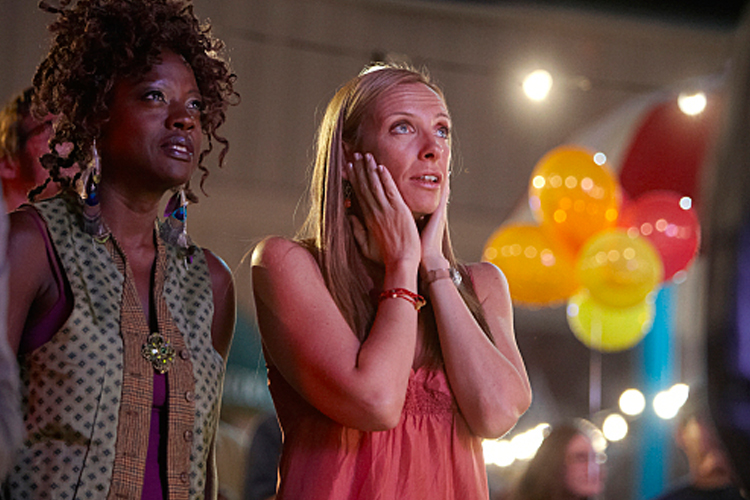 Viola & Toni Collette in "The United States of Tara"
Viola & Toni Collette in "The United States of Tara"
I still harbor foolish dreams of Hollywood permitting Davis to eventually move outside her wheelhouse. Davis deserves to show larger audiences the unexpectedly spry comic touch she exhibited in a lengthy, second season guest arc on Collette’s United States of Tara, in which Davis played a pot-toking, proto-Boho painter. Isn’t it about time someone allow Viola to laugh on screen (without the coaxing of Emma Stone) or at least let her enjoy herself? It’s true, Viola, like the world, deserves that long-overdue Fences movie, but I think she’s also earned herself a Claudine, that seldom-discussed 1974 romcom that features an Oscar-nominated Diahann Carroll and James Earl Jones as, respectively, an exhausted, working-class single mom of six and a zippy garbage man who fall in love in Harlem. Claudine is a sly, sexy, warmhearted good time of a movie that you’d be well-advised to check out ASAP if you have yet to, in addition to being one that deals head-on with race and poverty in a way that refuses to ironize, pander, or pity. If Hollywood still greenlit films as smart, tough, and inclusive as Claudine, I’d love to see Davis take a stab at the sort of rich and rounded comic role afforded here to Carroll. There is undoubtedly a better way to use Viola Davis’ inimitable gifts than applying them to background doctors and nameless lawyers, or else more bland, all-too-familiar vessels of both intrinsic wisdom and boundless support for some white, eat-pray-lovin’ girlfriends.
Davis may be signing up full-time at Shondaland, but she thankfully won’t be completely absent from the big screen next year. I hope that Chris Hemsworth isn’t the only one with something to do in Michael Mann’s upcoming cyber thriller Blackhat, leaving Viola to be “strong” from behind a desk, or stuck taking orders inside a control room. I still have no idea what to make of the mere existence of Lila & Eve, in which Davis and Jennifer Lopez (yep, Jenny from the Block) play Thelma and Louise mothers-turned-vigilantes, except that I hope it’s a ton of fun and that J. Lo can keep up. I hope that Davis’ passion project, a biopic of the groundbreaking politician and civil rights leader Barbara Jordan, finally gets some traction, since we’ve heard nary a word about it since Davis announced its development in March of 2012.
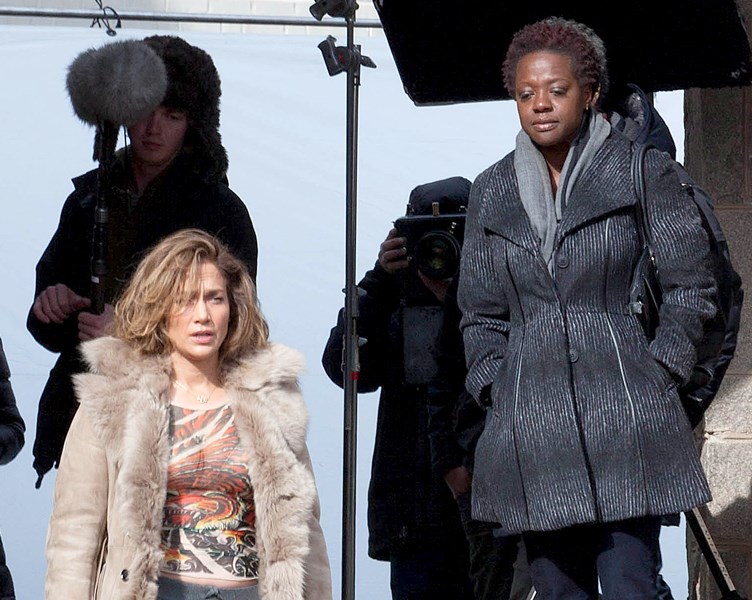 Jennifer Lopez & Viola on the set of "Lila & Eve"
Jennifer Lopez & Viola on the set of "Lila & Eve"
If my worst fears regarding all of these projects eventually come true, then I at least hope that How to Get Away with Murder is the instant hit it needs to be and rides that Scandal lead-in for all it’s worth. I hope that Viola snatches that Emmy statue right out of Claire Danes’ quivering hands and wins every gong she can, Temple Grandin-style. I hope that Annalise Keating is the dynamic, detailed, full-bodied part that Viola had in mind when she said in a crushing Entertainment Weekly piece, “I’m dark skinned, I’m quirky, I’m shy, I’m strong, I’m guarded, I’m weak at times, I’m sensual, I’m not overtly sexual. I am so many things in so many ways and I will never see myself on screen.”
I hope that Viola amazes the living, actress-loving daylights out of us on How to Get Away with Murder, so that somewhere, some producer or casting director or studio head will tune in and see her—really, fully see her. And I hope they think to themselves, with regret but also, maybe even possibility, what plenty of us have known all along: “Holy shit, that woman can act!”